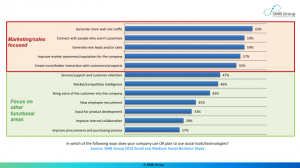Social Marketing
Can IBM Make the Social Business Connection with SMBs?

After 20 years, IBM has transformed its Lotusphere user conference into IBM Connect. This evolution has been in the making since IBM introduced its vision of “social business” a few years ago. During this time, IBM has added to its traditional Lotus messaging and collaboration solutions with new social, mobile, analytics and cloud solutions to broaden the scope of IBM Collaboration Solutions’ (ICS) charter.
As usual at these events, IBM showcased a panoply of new, updated and acquired solutions under the theme “From Liking to Leading”. I’d paraphrase IBM’s social business strategy as helping companies integrate new social tools with business workflows to operate more effectively–whether to increase employee productivity, improve customer service, streamline the supply chain or to market and sell goods and services. For example, IBM illustrated its approach to integrate social with key business processes through demos of its recently acquired Kenexa HR and talent management portfolio, and via its Smarter Commerce “buy, market, sell and service” platform.
While IBM’s broad definition of social business makes sense, it is also somewhat squishy depending on who, when, what, where and how the story is told. Furthermore, there are literally dozens of moving parts in the story, from the Lotus portfolio to IBM SmartCloud for Social Business to the new Smarter Workforce Kenexa strategy–not to mention integration with other IBM and partner solutions, and the services needed to use them effectively. This begs the question of whether IBM can effectively communicate its social business vision to SMBs–and maybe whether it should even try.
Making the Connection with SMBs
Currently, many SMBs equate social business to using public social media sites such as Twitter, Facebook and LinkedIn to promote and market their businesses. In fact, SMB Group’s 2012 SMB Social Business Study revealed that SMBs’ use of social in their businesses remains concentrated in marketing areas (Figure 1).
Figure 1: Medium Business: Current Use of Social Tools For Business Functions
 But interest in using social in other business areas is growing, especially among medium businesses with 100-999 employees–a prime target market for IBM. Medium businesses are increasingly using and finding value in social beyond the marketing realm.
But interest in using social in other business areas is growing, especially among medium businesses with 100-999 employees–a prime target market for IBM. Medium businesses are increasingly using and finding value in social beyond the marketing realm.
Meanwhile, as shown in Figure 2, just 13% of medium businesses view integrating social tools with traditional business applications as a very important, top priority.
Figure 2: Medium Business: Importance of Integrating Traditional Business Applications with Social Media Tools
 While 44% think it’s important, they either don’t have the time/resources for it, or will do it opportunistically. These companies in particular will require that vendors come to the table with clear messaging, accessible solutions, and the ability to demonstrate a rapid return on investment.
While 44% think it’s important, they either don’t have the time/resources for it, or will do it opportunistically. These companies in particular will require that vendors come to the table with clear messaging, accessible solutions, and the ability to demonstrate a rapid return on investment.
Given these realities, how likely is it that SMBs will connect with IBM’s social business story? Even though I was only one of a handful of SMB technology analysts at IBM Connect, I wasn’t the only one in the Analyst Q&A sessions asking how IBM will make its social business solutions more digestible not only for mid-market businesses, but for IBM business partners (most of whom are SMBs themselves). The dialogue exposed a healthy degree of skepticism about IBM’s ability to clarify its social business message and simplify how midmarket businesses access and use its solutions–and left it unclear as to how it will help its partners capitalize on this opportunity.
Should IBM Even Go There?
With IBM’s impressive and solid stronghold in the large enterprise space, why should it divert any of its attention and resources to the midmarket? After all, the midmarket requires entirely different solutions, services and sales approaches than in the large enterprise space. In fact, as I was tweeting key points and thoughts during one the Q&As, I had the following exchange:
@sliewehr: analyst q&a at #IBMConnect-?s re if IBM will sell to #SMBs. affirmation they will. #Idontgetit
@sliewehr: I’m not sure you need to orient products to SMBs in order to educate them if you’re IBM. Still odd to me.
@lauriemccabe: do you mean its odd that IBM wants to sell to SMB or something else? Not clear what you meant
@sliewehr: Yes…confused why IBM feels they should focus on SMB at all. It’s a tail-chasing game that they’ll lose to smaller innovators
@StuartMcIntyre: IBM doesn’t tend to do SMB well, but it’s a huge market that they’d be crazy to ignore. IBM+partners can reach it
@lauriemccabe Reasons IBM needs SMBs: 1-fuel its own growth 2-some SMBs grow up to become LEs 3-SMBs fueling growth/innovation
Why IBM Can’t Ignore SMBs in the Social Era
Admittedly, as an SMB analyst, I’m biased. But I see several reasons why IBM can’t ignore the need to develop a compelling social business story for SMBs, including:
- The size of the SMB market is too big to ignore. IBM needs to expand its market share here to fuel its own corporate growth.
- Fortune 500 turnover. Small companies become large businesses and large ones go out of business. 238 of the companies that made the 1999 Fortune 500 list had slipped off the 2009 Fortune 500 rankings. New technology solutions will only intensify this turnover, and agile innovative fast growth companies will start small but become the Amazons and Googles of the future.
- SMBs are leading the democratization trend in technology solutions. Because scarcity of IT and business process expertise is the norm in SMBs, they need solutions that they can deploy, use and become productive with quickly and easily. IBM needs firsthand insights into how SMBs use technology to most effectively capitalize on these trends and develop solutions that can scale up or down.
- Adoption of collaboration and social solutions is often viral. Collaboration is the only activity that every employee, in every company, engages in every day. User adoption of solutions in this space is as likely to be bottom up as top down, as evidenced by vendors as diverse as Dropbox and Twitter. In this market, solutions need to be appealing and accessible or users will bring their own to work.
Perspective
Will IBM be able to take its SMB game to the next level in social business in the SMB market? Some IBM social business offerings, such as Smart Cloud for Social Business, have the potential to tap into this opportunity, but IBM seems to move slowly and has little visibility compared to competitors, such as Google Apps for Business and Microsoft 365.
Overall, IBM is making a strong channel investment to enable its business partners, and especially Managed Service Providers (MSPs) to provide midmarket customers with its solutions. But unlike some other technology areas, social business is as much (if not more) of a cultural shift as a technology shift. Midmarket organizations don’t have as much bandwidth–or patience–to absorb complex messaging and solutions as large enterprises. And, let’s not forget, most of the channel partners that serve SMBs are themselves SMBs.
While IBM will almost certainly wear the social business crown in large enterprises, its ability to make significant inroads in the SMB market is questionable. Given the diverse, highly fragmented nature of both the SMB market and the partners that serve it, IBM needs to do a lot more work to make its solutions easier to understand, access, use and sell to make real headway.
[This post originally appeared on lauriemccabe.com and is reposted with permission.]
Want to read more insider-perspective posts? Browse our entire archive of blog posts on news from the software industry by visiting the Industry Insights of the Business-Software.com blog.





